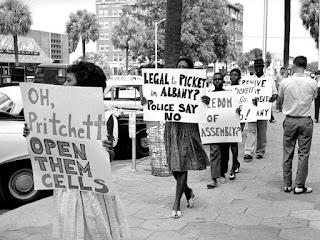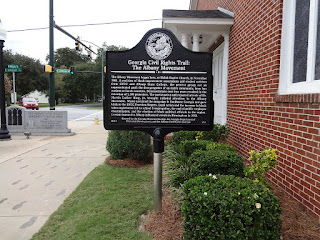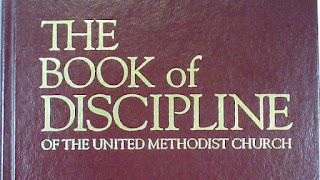CHRIST IN WINTER: Reflections on Faith & Life for the Years of Winter:
[Third of a four-part
series for Black History Month]
Albany, Georgia in 1965
had a population of 90,000, about 38% black. Early in the summer, Sisters of
Providence Mary Jean Mark and Alma Louise Mescher made the rounds of merchants
in town, getting donations of chairs and paint and tubs and buckets and other
items the Freedom Center needed. The SCOPE folks were pleased that white merchants
would be so generous, especially considering why the Freedom Center was there,
so that black folks could be full citizens.
Turns out that all some people saw when a nun approached in those days was the full black habit. “Those habits got things done that other people couldn’t do,” Bob Mullins said. The nuns were always in full habit in those days.
The full black habit was one reason SNCC thought the nuns would not last two weeks. Albany in summer is 90 degrees of heat and another 90 of humidity. Those black habits were heat catchers without ventilation. And little children, wearing almost nothing because of the heat, made it worse by constantly running up to them and hugging their legs and hanging on their arms.
Physical discomfort,
though, meant nothing to those Sisters of Providence. The local Catholics
offered them space in a convent, but that would have taken them out of the
ghetto where they were working. They knew they had to live with the people they
were serving. They stayed in the falling-down building with the broken windows.
Those black nun habits
were especially useful when they encountered “the Albany system,” that gave the
city a false reputation for racial progress. The Albany system was to wear
people down with constant harassment. For instance, Georgia did not require
folks who were going to be there for only ten weeks in the summer to get new
car license plates and driver’s licenses, but Albany did. SCOPE workers and
local demonstrators were arrested regularly, sometimes more than once a day.
The SCOPE workers were not a big problem. They were white. Bob Mullins just
went down to the jail and paid their fine.
Black demonstrators were a
different problem. The sheriff didn’t want to let them out, and often sent them
to jail in other counties. In one instance, some demonstrators were arrested
“for blocking the sidewalk” while picketing a grocery. Some were as young as
eleven. They were kept in jail. Their parents found out they weren’t being fed
and took food to the jail. The sheriff wouldn’t let them in. So the aptly named
Sisters of Providence took the food to the jail. The sheriff took one look and
decided he didn’t want to deal with the fallout from them.
They local newspapers
praised the Dougherty County sheriff for his handling of the “nigger
demonstrators problem.” [Yes, the newspapers referred to black folks as
“niggers.”] He described “the Albany strategy” as “meeting non-violence with
non-violence.” He just arrested anyone who looked like they might be about to
demonstrate and sent them to jail, often in other counties.
The strategy was not to do
violent things that could be reported in the northern media, but to do minor
things that seemed like cooperation when people were looking, and do lots of
harassment in private—arrests, fines, isolation, hunger, bureaucratic nonsense—the
rest of the time.
And Albany was considered racially progressive in 1965!
John Robert McFarland


























